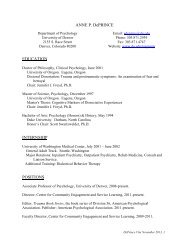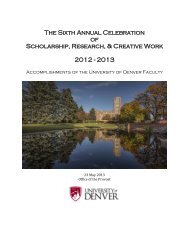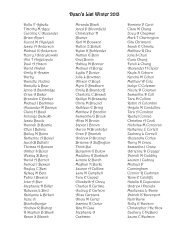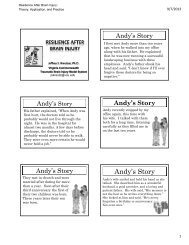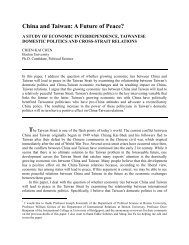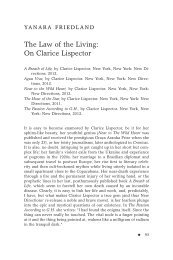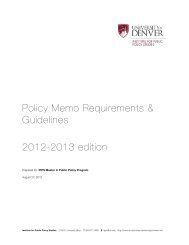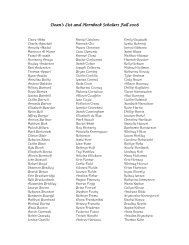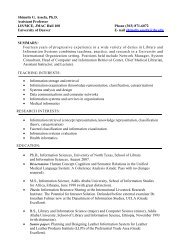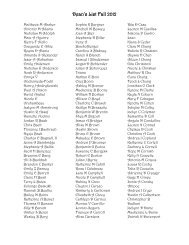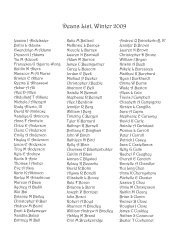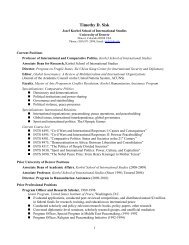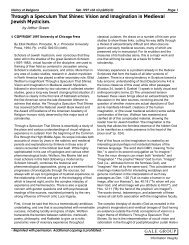You also want an ePaper? Increase the reach of your titles
YUMPU automatically turns print PDFs into web optimized ePapers that Google loves.
Associate Pr<strong>of</strong>essor Eugene Walls and Jacquelyn<br />
Eisenberg (MSW ‘08) at a “peace wall” that divides<br />
Belfast neighborhoods. A tribute to republican hero<br />
Bobby Sands appears on the republican side <strong>of</strong> the<br />
wall (top), while the loyalist side <strong>of</strong> the wall includes<br />
this portrait <strong>of</strong> England’s King William III.<br />
Seeking Common Ground Director <strong>of</strong> Programs Jacquelyn Eisenberg<br />
(MSW ’08) and SCG Executive Director Erin Breeze join Associate<br />
Pr<strong>of</strong>essors Nicole Nicotera and Eugene Walls as they tour a Habitat for<br />
Humanity site in Belfast.<br />
10 spring 12 where in the world is <strong>GSSW</strong>?<br />
Social Work Practice in Deeply<br />
Divided Societies<br />
by Associate Pr<strong>of</strong>essor Nicole Nicotera, PhD, and<br />
Associate Pr<strong>of</strong>essor Eugene Walls, PhD<br />
The legacy <strong>of</strong> British colonialism in Northern Ireland<br />
makes an excellent case study from which to deepen our<br />
understanding <strong>of</strong> issues <strong>of</strong> difference in our own society.<br />
Getting outside <strong>of</strong> American culture and its pervasive racism,<br />
sexism, classism and other divides, enables us to more<br />
clearly see how policy, structural violence, political rhetoric<br />
and even art can become tools that reinforce and<br />
maintain power, oppression and privilege. Over<br />
time, and across generations, stratification <strong>of</strong>ten<br />
becomes legitimized and justified, and comes to be<br />
seen as almost “natural.”<br />
The solutions for maintaining “the peace” between<br />
loyalists (Protestants) and republicans<br />
(Catholics) in Northern Ireland will<br />
likely seem shocking to students. There<br />
are “peace walls” in interface zones that<br />
are closed at 6:00 p.m. to avoid violence.<br />
There are segregated schools where<br />
children from the loyalist community<br />
grow up without ever interacting with<br />
children from the republican community. And there<br />
are segregated neighborhoods where residents will<br />
walk miles to avoid shopping in stores that are<br />
closer but owned and run by the Other.<br />
While American media has <strong>of</strong>ten simplified “The<br />
Troubles” in Northern Ireland as a struggle between<br />
Catholics and Protestants, this deeply rooted conflict is not<br />
about differences in religious beliefs or practices, but rather<br />
about differences between those who view themselves as<br />
connected to the United Kingdom (loyal to the crown or<br />
loyalists) and those who view themselves as connected to<br />
the Republic <strong>of</strong> Ireland (republicans).<br />
Last December, a <strong>University</strong> <strong>of</strong> <strong>Denver</strong> Internationalization<br />
Grant allowed us to travel to Ireland to develop the in-<br />
country portion <strong>of</strong> a future <strong>GSSW</strong> course, “Social Work’s<br />
Response to Macro-Level Political Violence: The Case <strong>of</strong><br />
Northern Ireland.” Accompanying us on the trip were<br />
two pr<strong>of</strong>essional colleagues from the <strong>Denver</strong>-based non-<br />
pr<strong>of</strong>it, Seeking Common Ground: Executive Director<br />
Erin Breeze and Director <strong>of</strong> Programs Jacque Eisenberg<br />
(MSW ‘08).<br />
Students who participate in the MSW course we are<br />
developing will examine the history and background <strong>of</strong><br />
The Troubles in order to better understand the current<br />
situation, along with social work’s role in addressing<br />
issues between deeply divided communities. In addition<br />
to meeting with social service providers, researchers,<br />
educators and human rights practitioners, students will<br />
meet men and women who have been involved in the<br />
conflict, including former IRA and loyalist paramilitary<br />
personnel, many <strong>of</strong> whom have served time in prison for<br />
their role in the conflict.<br />
The course will begin in Dublin, Ireland, examining the<br />
situation from the Irish point <strong>of</strong> view, continue on to Derry<br />
where the infamous Bloody Sunday incident occurred, and end<br />
in Belfast, the center <strong>of</strong> some <strong>of</strong> the most intractable violence<br />
<strong>of</strong> The Troubles. In contrast to the conflict and divisions that<br />
have characterized The Troubles, contemporary practitioners,<br />
educators, researchers and other individuals have embraced<br />
a focus on peace and reconciliation. There are many lessons<br />
we will learn from the methodologies they have used, and<br />
are currently using, to heal from decades <strong>of</strong> violence and<br />
conflict.<br />
Where in theWorld is <strong>GSSW</strong>?<br />
noRtHeRn iReland | cHina<br />
Along the way, we will be asking ourselves a number <strong>of</strong><br />
questions: What roles have social workers played in peace<br />
and reconciliation work? What interventions at the macro and<br />
micro levels have been tried within a society whose divisions<br />
have existed for generations? What has worked, and what<br />
has not? And, finally, what does this work tell us about the<br />
divisions in our own country and the role we can play as social<br />
workers in repairing those divisions?<br />
Our hope is that students who participate in this international<br />
experience will gain a deeper commitment to their<br />
responsibility as global citizens, broaden their understanding<br />
<strong>of</strong> the role social work can play in peace and reconciliation<br />
efforts, and learn important skills—both micro and macro—<br />
that can be used in their future practice models.<br />
Learning from the Globe<br />
by Dean Emeritus and Research Scholar Jack Jones, PhD<br />
The Irish emigrate, and—being Irish—so did I. My job-hopping<br />
started when I came to the States for graduate work and shortly<br />
afterwards became dean at the <strong>University</strong> <strong>of</strong> Minnesota-Duluth.<br />
Far too cold there, I switched to the warmer Chinese <strong>University</strong> <strong>of</strong><br />
Hong Kong. But feeling homesick for America, I landed back here.<br />
My fascination with international social development, however, really<br />
began in Asia. While in Hong Kong, I had an opportunity to assist in<br />
training courses conducted by various United Nations bodies. Among<br />
the most impressive U.N. agencies was the United Nations Centre<br />
for Regional Development (UNCRD) based in Nagoya, Japan—with a<br />
regional <strong>of</strong>fice in Nairobi, Kenya.<br />
Dean Emeritus Jack Jones visits “old Beijing” in 2000.<br />
In the days <strong>of</strong> telegrams, mine went astray and under the impression<br />
I’d been invited for an interview at DU, I flew to <strong>Denver</strong> only to be<br />
asked when I phoned the chair <strong>of</strong> the Dean’s Search Committee<br />
from the airport, “Jack Who?” But the outcome wasn’t bad, the<br />
job-hopping turned out nicely, and <strong>GSSW</strong> hired me—possibly out<br />
<strong>of</strong> embarrassment. Maybe the United Nations connection helped<br />
a little. At any rate, I was soon able to use that link to advantage.<br />
Thanks to a change in the American-Chinese political climate, my<br />
visit to China in 1987 began <strong>GSSW</strong>’s relationship with Beijing’s<br />
China Youth <strong>University</strong>, and led to a series <strong>of</strong> faculty and student<br />
exchanges. Other research and training projects have followed.<br />
When my days as dean were done, I moved to DU’s Conflict Resolution<br />
Institute as a research pr<strong>of</strong>essor and then, at Dean Williams’ kind<br />
where in the world is <strong>GSSW</strong>? spring 12 11



